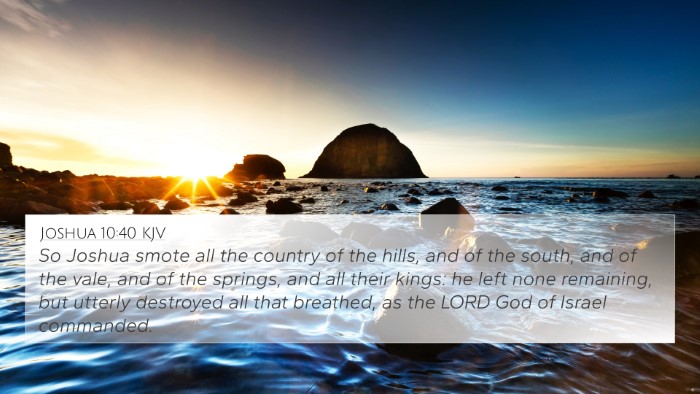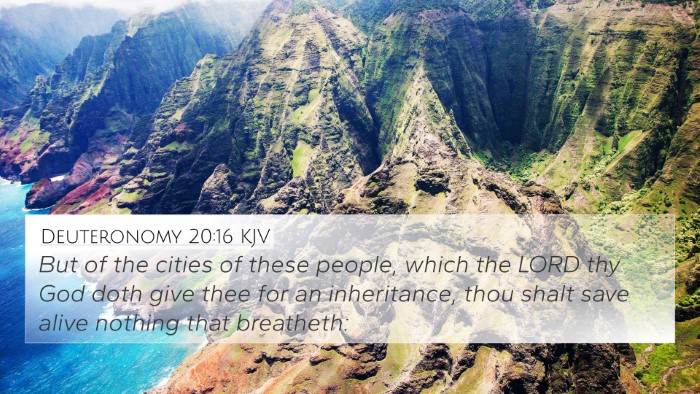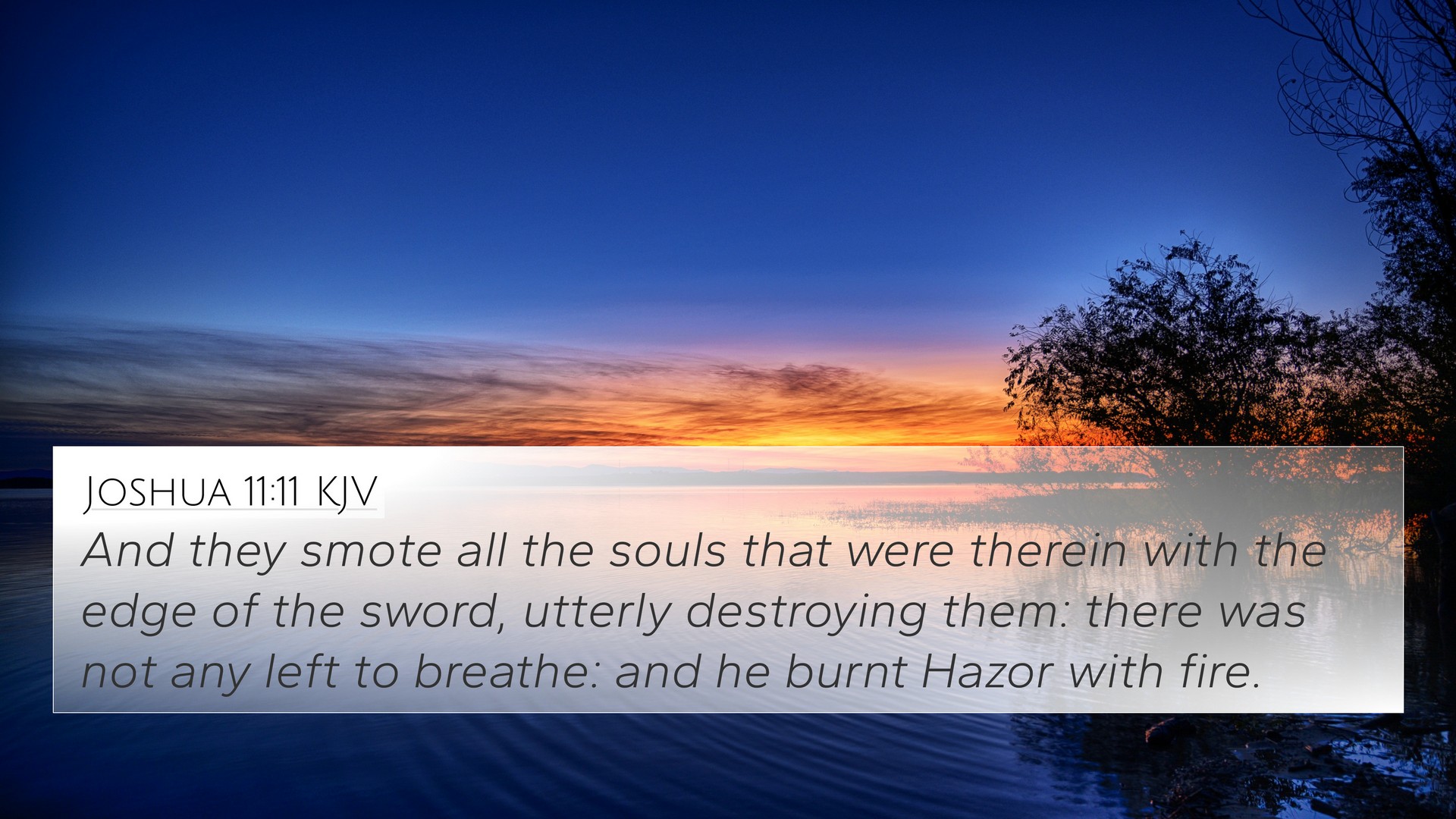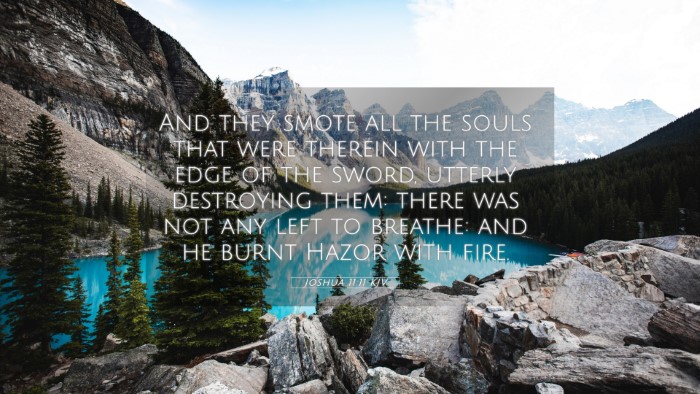Old Testament
Genesis Exodus Leviticus Numbers Deuteronomy Joshua Judges Ruth 1 Samuel 2 Samuel 1 Kings 2 Kings 1 Chronicles 2 Chronicles Ezra Nehemiah Esther Job Psalms Proverbs Ecclesiastes Song of Solomon Isaiah Jeremiah Lamentations Ezekiel Daniel Hosea Joel Amos Obadiah Jonah Micah Nahum Habakkuk Zephaniah Haggai Zechariah MalachiJoshua 11:11 Similar Verses
Joshua 11:11 Cross References
And they smote all the souls that were therein with the edge of the sword, utterly destroying them: there was not any left to breathe: and he burnt Hazor with fire.
Uncover the Rich Themes and Topics of This Bible Verse
Listed below are the Bible themes associated with Joshua 11:11. We invite you to explore each theme to gain deeper insights into the Scriptures.
Joshua 11:11 Cross Reference Verses
This section features a detailed cross-reference designed to enrich your understanding of the Scriptures. Below, you will find carefully selected verses that echo the themes and teachings related to Joshua 11:11 KJV. Click on any image to explore detailed analyses of related Bible verses and uncover deeper theological insights.

Joshua 10:40 (KJV) »
So Joshua smote all the country of the hills, and of the south, and of the vale, and of the springs, and all their kings: he left none remaining, but utterly destroyed all that breathed, as the LORD God of Israel commanded.

Deuteronomy 20:16 (KJV) »
But of the cities of these people, which the LORD thy God doth give thee for an inheritance, thou shalt save alive nothing that breatheth:
Joshua 11:11 Verse Analysis and Similar Verses
Understanding Joshua 11:11
Joshua 11:11 states, "And they smote all the souls that were therein; there was not left any to breathe: and he burnt Hazor with fire." This verse marks a pivotal moment in the conquest of Canaan, highlighting God's command and the execution of judgment against the Canaanite cities, particularly Hazor, which was noted for its significance and power.
Meaning and Interpretation
This verse can be analyzed through several lenses, drawing insights from renowned public domain commentaries:
- Matthew Henry: He emphasizes the comprehensive nature of God's judgment. Henry indicates that the destruction of Hazor was a clear statement of God's power and the consequence of turning away from Him. He notes that the Canaanite towns represented rebellion against God, and thus their annihilation served as both a warning and a fulfillment of divine prophecy.
- Albert Barnes: Barnes focuses on the historical context of Hazor, describing it as a principal city in northern Canaan and a hub of military organization. He suggests that the burning of Hazor symbolizes the ultimate defeat of Canaanite culture and its opposition to Israel's divine mission.
- Adam Clarke: Clarke presents a theological reflection, asserting that the destruction of entire cities is a matter of divine justice. He encourages readers to see that God, in His sovereignty, reserves the right to judge nations and people, as illustrated through the events in Joshua.
Cross-References for a Comprehensive Understanding
When examining Joshua 11:11, several related verses illustrate the broader biblical narrative of judgment, conquest, and divine sovereignty:
- Deuteronomy 7:2: "And when the Lord thy God shall deliver them before thee; thou shalt smite them, and utterly destroy them; thou shalt make no covenant with them, nor show mercy unto them."
- 1 Samuel 15:3: "Now go and smite Amalek, and utterly destroy all that they have, and spare them not; but slay both man and woman, infant and suckling, ox and sheep, camel and ass."
- Romans 1:18: "For the wrath of God is revealed from heaven against all ungodliness and unrighteousness of men, who hold the truth in unrighteousness."
- Revelation 20:9: "And they went up on the breadth of the earth, and compassed the camp of the saints about, and the beloved city: and fire came down from God out of heaven, and devoured them."
- Hebrews 11:30: "By faith the walls of Jericho fell down, after they were compassed about seven days."
- Joshua 10:28: "And that day Joshua took Makkedah, and smote it with the edge of the sword, and the king thereof he utterly destroyed, them, and all the souls that were therein; he left none remaining."
- Psalm 37:20: "But the wicked shall perish, and the enemies of the Lord shall be as the fat of lambs: they shall consume; into smoke shall they consume away."
Thematic Connections
This verse invites a deeper exploration into the themes of judgment and divine justice found throughout scripture. Understanding these links offers a richer perception of God's ongoing narrative, emphasizing His righteousness:
- Linking Bible Scriptures: The occurrences of judgment in both the Old and New Testaments affirm God's consistency in dealing with sin.
- Comparative Bible Verse Analysis: Analyzing Joshua 11:11 alongside the instructions given in Deuteronomy sheds light on the divine mandate for Israel's conquest.
- Bible Concordance Insights: Utilizing a Bible concordance can help in identifying other instances where divine judgment is executed, providing context and understanding of God's actions throughout scripture.
- Inter-Biblical Dialogue: The discussion between God's judgment in the Old Testament and His mercy in the New Testament forms a crucial dialogue for understanding the character of God.
Practical Application
Conclusion
In studying Joshua 11:11, readers are encouraged to reflect on the implications of judgment and mercy in their own lives. How does one reconcile divine righteousness with personal accountability? This contemplation is essential in practical Christian living:
- Tools for Bible Cross-Referencing: Engaging with tools and methods to explore biblical cross-references can deepen one’s understanding of scripture.
- Bible Cross-Reference Guide: Seeking guidance on how to effectively use cross-references aids in comprehensive Bible study.
- Interpreting Biblical Themes: Understanding how themes of judgment and mercy are interwoven throughout the Bible can help in grasping the full character of God as portrayed in scripture.
Joshua 11:11 serves as a powerful reminder of God's sovereignty and the seriousness with which He addresses sin within human systems. The destruction of Hazor is not merely historical; it signifies God's active role in the world, balancing justice and mercy throughout biblical history. Through careful cross-referencing and study, readers can uncover the layered meanings and connections in scripture, fostering a richer understanding of their faith.


